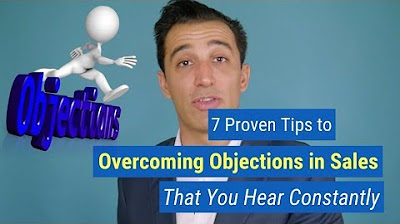Closing the Sale: 9 Common Objections
Summary
TLDRThis video script outlines nine common types of objections faced in sales, with strategies for handling each one effectively. It covers unspoken objections, excuses, malicious objections, requests for information, showoff objections, subjective or personal objections, objective objections, general sales resistance, and last-ditch objections. The script emphasizes the importance of asking open-ended questions, listening actively, and maintaining a positive, calm attitude to guide prospects through their concerns and successfully close sales.
Takeaways
- 😀 Unspoken objections occur when a customer has concerns but doesn't voice them. To handle this, ask open-ended questions and listen carefully to uncover hidden objections.
- 😀 Excuses are instinctive, non-serious objections. The best way to handle them is to empathize and share a success story of other customers overcoming similar objections.
- 😀 Malicious objections arise when a customer is angry or upset about their situation and takes it out on the salesperson. Stay calm, confident, and ask more questions to redirect the conversation.
- 😀 Requests for information indicate a strong interest in your product or service. This is a great opportunity to provide detailed answers and move closer to closing the sale.
- 😀 Showoff objections happen when a prospect tries to demonstrate their knowledge about your product or industry. Flatter them and use their knowledge to build rapport and strengthen the relationship.
- 😀 Subjective or personal objections are aimed at you as the salesperson. Shift the focus back to the customer by asking them questions about their needs and listening to their responses.
- 😀 Objective or factual objections concern the product or service itself. Answer these objections with proof and clear explanations to reassure the customer and increase the likelihood of closing.
- 😀 General sales resistance is common at the beginning of a presentation. To overcome it, ask open-ended qualifying questions after gaining the customer's permission to proceed.
- 😀 The last-ditch objection occurs when the customer is on the verge of buying but hesitates. Acknowledge their concerns respectfully, reassure them about the value of your offering, and confidently close the sale.
- 😀 Always be prepared for different types of objections and practice active listening. The more you understand and address objections, the more effective you will be in closing sales.
Q & A
What is the first type of sales objection mentioned in the script?
-The first type of sales objection is an unspoken objection, where the customer has concerns but doesn't communicate them directly.
How can you handle unspoken objections effectively?
-To handle unspoken objections, ask open-ended questions such as 'What,' 'Why,' 'How,' and listen carefully to the answers. This encourages the prospect to reveal their hidden concerns.
What are excuses in sales, and how should they be dealt with?
-Excuses are instinctive, often knee-jerk reactions to sales pitches. They are not serious objections. The best way to handle them is by agreeing with the excuse and then asking a follow-up question to take control of the conversation.
What is a suggested phrase to overcome common excuses from prospects?
-A suggested phrase is: 'That's alright, most people in your situation felt the same way when I first called on them, but now they have become our best customers and recommend us to their friends and family.'
What are malicious objections, and how should you respond to them?
-Malicious objections occur when a customer is upset about something unrelated to the product and takes their frustration out on the salesperson. The key is to remain calm, confident, positive, and polite, and redirect the conversation by asking more questions about their needs.
What type of objection is considered the most positive in a sales interaction?
-A request for information is the most positive type of objection. It indicates interest and provides an opportunity to demonstrate the value of your product or service.
How should you respond to a prospect who tries to show off their knowledge about your product?
-Flatter the prospect by acknowledging their knowledge. For example, say, 'Wow, you really know a lot about this!' This builds rapport and keeps the conversation positive.
What are subjective or personal objections, and how should they be handled?
-Subjective or personal objections are criticisms directed at you as a person. To handle them, focus the conversation on the customer by asking questions about their needs and desires.
What is the difference between objective and subjective objections?
-Objective objections are related to the product or service itself, such as questions about how it works or its features. Subjective objections are directed at the salesperson personally, often due to the prospect's perception or emotional response.
How can you overcome general sales resistance at the beginning of a presentation?
-To overcome general sales resistance, ask permission to ask questions, such as 'May I ask you a couple of questions?' This helps break the ice and lowers the prospect's resistance, allowing for a more open conversation.
Outlines

This section is available to paid users only. Please upgrade to access this part.
Upgrade NowMindmap

This section is available to paid users only. Please upgrade to access this part.
Upgrade NowKeywords

This section is available to paid users only. Please upgrade to access this part.
Upgrade NowHighlights

This section is available to paid users only. Please upgrade to access this part.
Upgrade NowTranscripts

This section is available to paid users only. Please upgrade to access this part.
Upgrade NowBrowse More Related Video

Common Cold Call Objections and How To Overcome Them

The 5-Step Process to Overcome Any SMMA Objection

Sales Was Hard Until I Understood These 9 Concepts

7 (Proven) Tips to Overcoming Objections in Sales That You Hear Constantly [Avoidance]

TIPOS DE CLIENTES (09 Principais Tipos De Consumidores Para Trabalhar No Seu Negócio)

Como lidar com objeções? O Guia Definitivo para QUEBRAR qualquer objeção do seu cliente!
5.0 / 5 (0 votes)